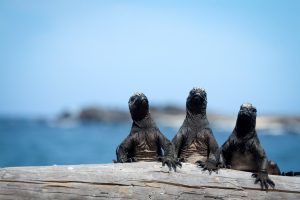Grand Challenges & Mission
Grand Challenges that Frame the Galapagos Initiative:
- Assess island ecosystems and resolve the social-ecological threats to their sustainability,
- Foster the health and well-being of people, animals, and ecosystems to better understand the complex interactions between people and the environment, and
- Promote stewardship and extend our knowledge of global environmental change, social and evolutionary adaptation, and the dynamics of local places and global contexts to benefit the Galapagos Islands, North Carolina, and the world.

Mission of the Galapagos Initiative:
- Improve the scientific understanding of the linked social, terrestrial, and marine sub-systems in the Galapagos Islands to better inform policies and practices of the Galapagos National Park and to encourage wise stewardship throughout the Galapagos Islands and beyond,
- Develop an integrative and interdisciplinary program of research, education, and outreach that emphasizes the interactions among population, health, and environment,
- Educate UNC students, local people, and citizens of the world about the challenges to stewardship of protected areas and marine reserves and the relevance of a coupled human-natural systems approach to study island and coastal ecosystems and their sustainability,
- Translate the results of our integrative research into tools, techniques, and new knowledge about island and coastal ecosystems in the Galapagos and North Carolina, and also develop a template to address other similarly challenged settings around the globe through an integrative approach of innovation, discovery, and learning.
Watch this overview of the Galapagos Initiative and our work at the CGS and GSC:
In 2021, we celebrated our 10-year anniversary and some big milestones we’ve hit:
